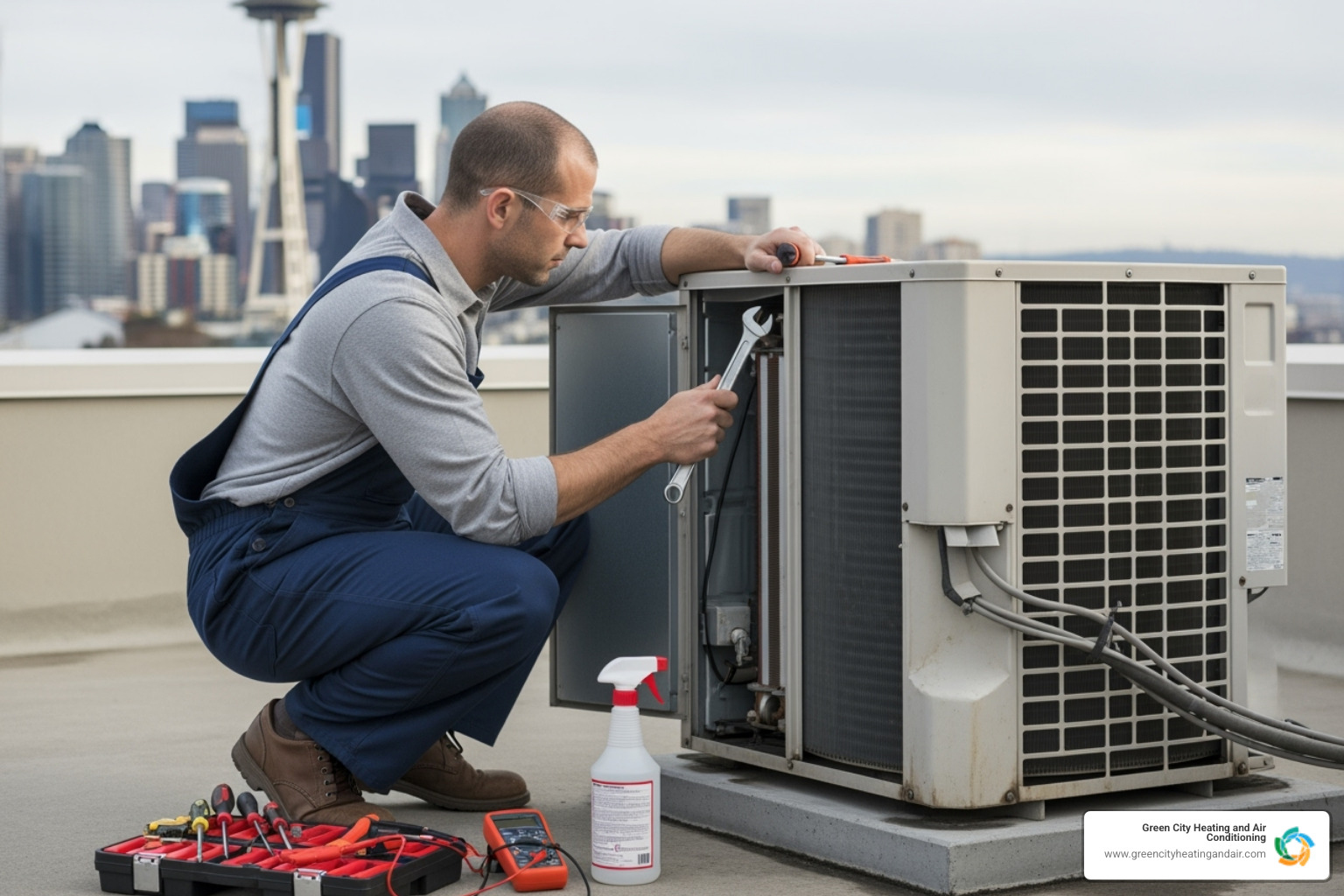Why Seattle-Area Homeowners Need More Than Basic AC Fixes
When your home ac repair needs go beyond just getting cold air flowing again, you're dealing with comfort, health, and efficiency issues that affect your entire household. Here's what you need to know about comprehensive AC solutions:
Essential Home AC Repair Services:
- Airflow Problems - Weak or uneven cooling throughout your home
- Indoor Air Quality - Humidity control and filtration issues
- Energy Efficiency - Rising bills from poorly functioning systems
- System Reliability - Preventing frequent breakdowns and emergency calls
- Component Replacement - Capacitors, contactors, and fan motors
- Refrigerant Services - Leak detection and proper charging
It's a surprisingly hot and humid day in the Pacific Northwest. Your clothes feel sticky even though the AC is on. This scenario plays out in homes across the Seattle area when air conditioning systems develop problems that go far beyond simple temperature control.
Most homeowners think AC repair is just about getting cold air again. But modern systems also handle humidity control, air filtration, and energy efficiency—all critical for true home comfort. When these systems falter, you might get cool air but still feel uncomfortable, face high energy bills, or deal with poor indoor air quality.
The good news? Most HVAC systems can last up to 20 years with regular service and timely repairs. Understanding what your AC system does and recognizing problems early can save you money and discomfort.
This guide walks you through identifying AC problems, simple troubleshooting steps, and when to call Green City Heating and Air Conditioning for professional help.
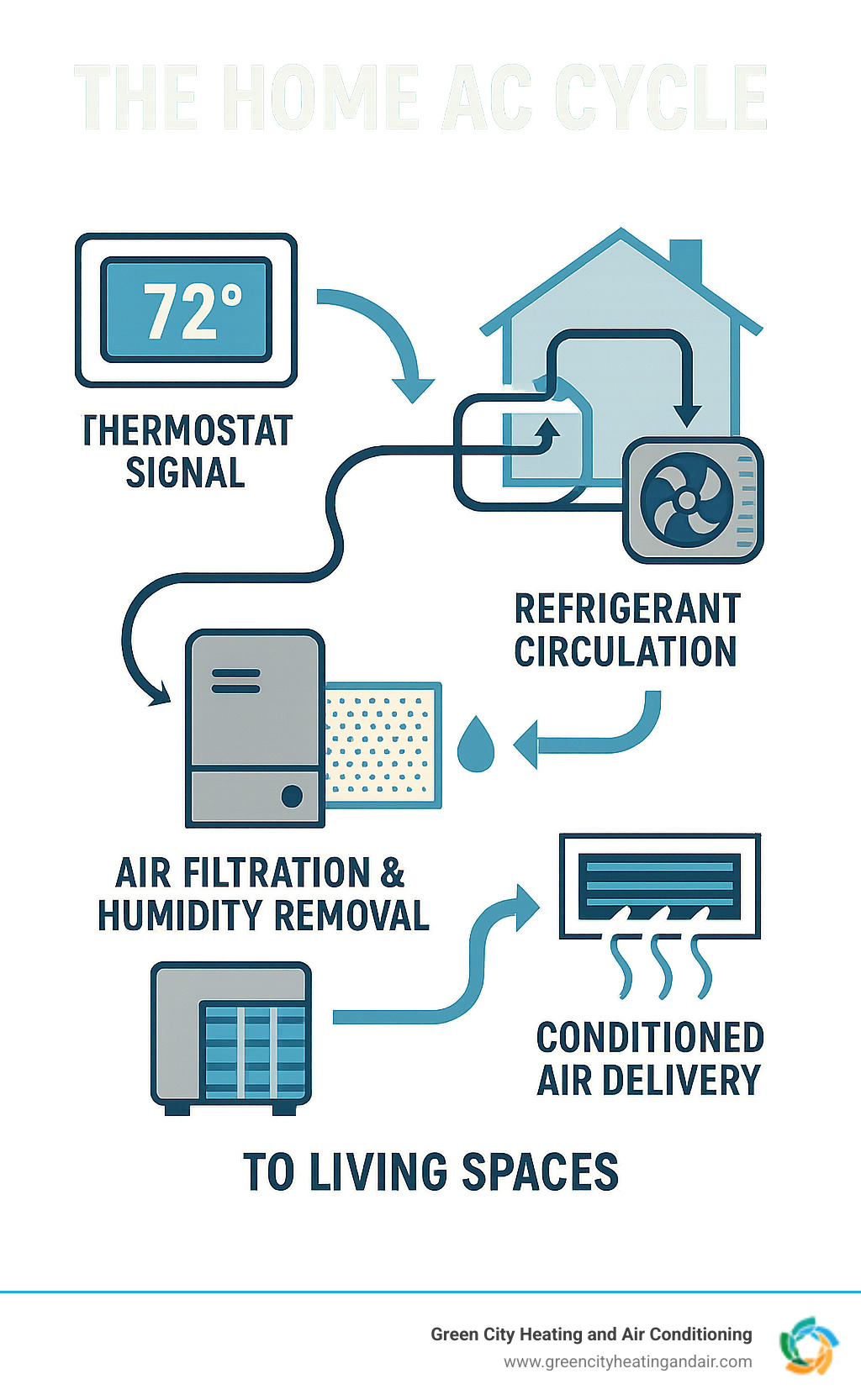
Recognizing the Red Flags: When Your AC Needs Attention
Your air conditioner communicates through sounds, smells, and performance changes. Learning to recognize these warning signs can save you from sweltering through a Pacific Northwest heat wave while waiting for repairs.
Weak airflow is a common first sign. If you barely feel air from your vents or some rooms stay stuffy, something is likely blocking the air's path, such as a clogged filter, leaky ducts, or a struggling blower fan.
Listen for unusual noises. While a gentle hum is normal, screeching, grinding, or hissing mean trouble. A screech might be a failing belt, while hissing often signals a refrigerant leak.
Foul odors are another giveaway. A musty smell usually points to mold or mildew in your ducts or evaporator coil. A burning smell indicates an electrical problem that needs immediate attention.
The most obvious red flag is warm air blowing from your vents. This could range from a tripped circuit breaker to a major compressor problem.
In the humid Pacific Northwest, your AC should control indoor high humidity. If your home feels sticky with the AC running, the system is struggling with moisture removal, which can point to sizing or drainage issues.
Water leaks around your indoor or outdoor unit are never normal. Indoor puddles usually mean a clogged drain line, while outdoor leaks might indicate refrigerant issues or melting frozen coils.
Short cycling, when your AC turns on and off in short bursts, wastes energy and puts immense stress on your compressor.
Finally, if your high energy bills suddenly spike, your AC might be working overtime to compensate for a developing problem.
Common Causes of AC Malfunctions
Behind every home ac repair call, there's usually one of several common culprits. Understanding these can help you spot problems early.
Clogged air filters are the most preventable problem. A dirty filter restricts airflow, forcing your system to work harder and potentially freeze up. Check your filter monthly and change it every 1-3 months.
Refrigerant leaks are serious. Refrigerant is your AC's lifeblood. When it leaks, your system can't cool effectively. This is not a DIY fix and requires a certified professional.
Frozen evaporator coils occur when airflow is restricted or refrigerant is low. An iced-over coil cannot absorb heat from your home.
Dirty condenser coils on your outdoor unit can't release heat efficiently if they are covered in dirt and debris. This forces the system to work harder and can lead to premature failure.
Fan problems in either the indoor or outdoor unit can cause poor air movement, leading to overheating and system shutdown.
Thermostat issues like dead batteries or faulty wiring can prevent your system from responding correctly.
Electrical control failure often involves small but vital components like capacitors and contactors. When these inexpensive parts fail, your entire system stops working.
Clogged drain lines can cause significant water damage. As your AC removes humidity, the moisture drains away. If the line is blocked by algae or debris, water backs up, which can trigger a safety switch to shut down the AC to prevent a flood.
Your First Line of Defense: DIY Troubleshooting
Before calling for a repair, a few simple troubleshooting steps might solve the problem and save you a service call.

Safety first: Always turn off the power to your AC system before touching any components. Flip the circuit breaker in your main electrical panel and pull the disconnect block from the box next to your outdoor unit.
Now for the detective work. Start with a thermostat check. Ensure it's set to 'Cool' and the temperature is set lower than the current room temperature. Check that the fan is on 'Auto' and replace the batteries if it has them.
Next, check your circuit breaker. If the breaker for your AC has tripped, flip it fully to 'Off' and then back to 'On.' If it trips again immediately, stop and call a professional, as you have an electrical issue.
Inspect your air filter. If it's clogged with dust and debris, replace it with a new one. A blocked filter is a common cause of AC problems.
Perform an outdoor unit inspection. With the power off, clear away any leaves, grass clippings, or overgrown bushes from around the condenser unit. It needs at least two feet of clear space to breathe.
While outside, use a garden hose for some gentle debris clearing. Gently spray the condenser coils to knock loose any dirt between the fins. Avoid high pressure, as the fins are delicate.
If you suspect frozen coils, turn your AC to 'Fan Only' mode for a few hours to allow the ice to melt. Once thawed, check the filter and ensure all vents are open.
If these steps don't work, the problem likely runs deeper. That's when our home ac repair expertise is needed.
Simple Maintenance to Prevent Breakdowns
The best repair is one you never need. Regular attention can prevent most summer breakdowns.
Regular filter changes make the biggest difference. Check your filter monthly and replace it every 1-3 months, or more often if you have pets or allergies.
Coil cleaning is also important. Beyond a gentle rinse, professional cleaning during an annual service can improve efficiency by up to 15%.
Keep your drain lines clear. Every few months, pour a cup of distilled vinegar mixed with water down the condensate drain line to prevent clogs from algae and mold.
Keeping your outdoor unit clear is an ongoing task. Maintain at least two feet of clear space around the unit by trimming shrubs and removing debris.
While these DIY steps help, they don't replace professional tune-ups. We recommend annual service (or twice yearly for heat pumps) to catch issues you can't see, clean components you can't reach, and optimize your system's performance, saving you money on energy bills.
The Big Decision: Repair vs. Replace
A common question we hear from Seattle-area homeowners is whether to repair or replace a faulty AC. It's a significant decision, especially when you're dealing with a Pacific Northwest heat wave.
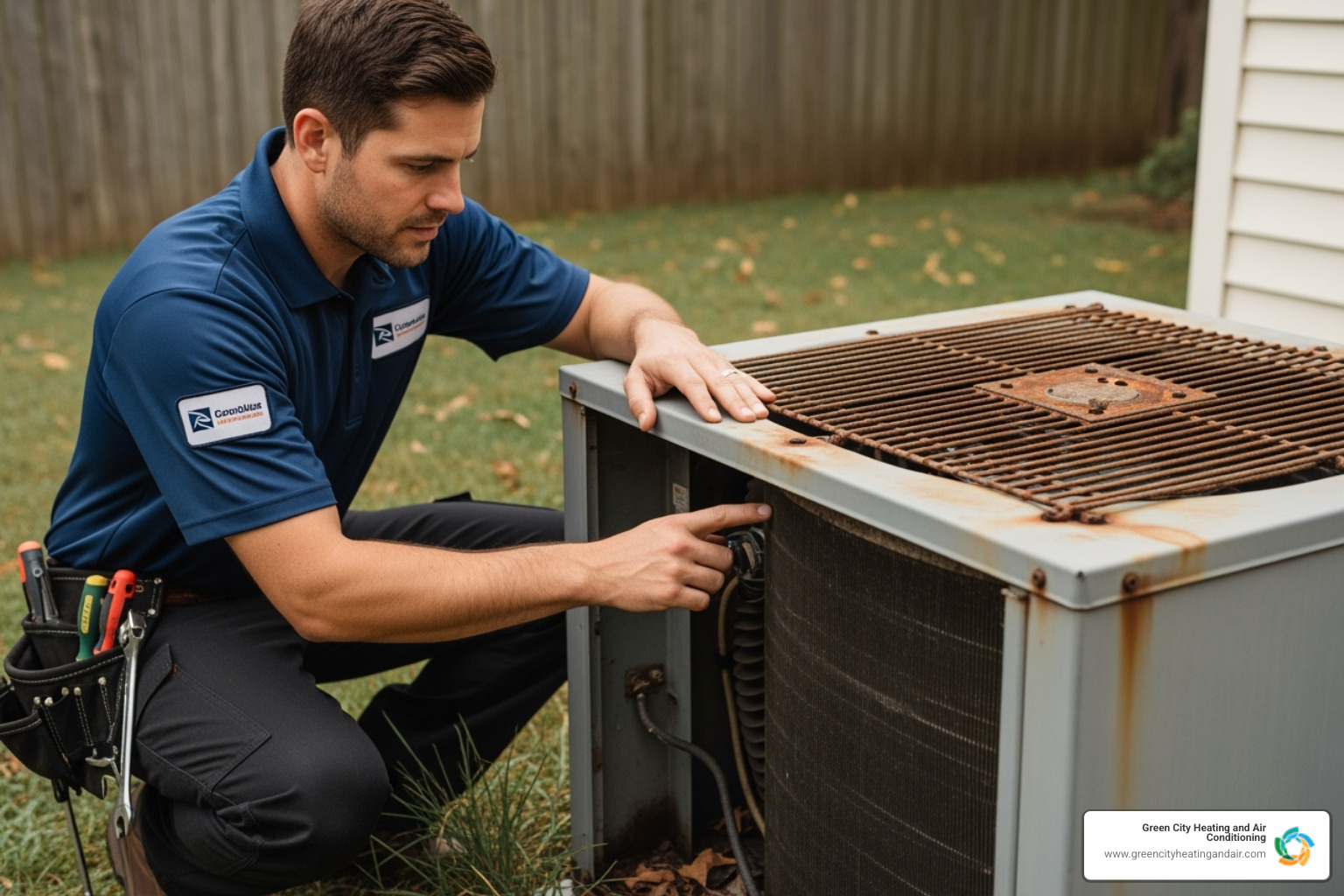
Most HVAC systems can last up to 20 years with regular service and timely repairs, but that doesn't mean every system should. The typical lifespan for an air conditioner is about 10 to 15 years with proper maintenance.
If your AC unit is only 7 years old and needs a minor fix, a home ac repair makes sense. But if your system is pushing 15 years and needs major work, replacement may be the better option.
Several factors tip the scales toward replacement. Frequent breakdowns are a major red flag, as repair bills add up quickly. Rising energy costs are another sign, as older units are less efficient than modern systems.
Another issue is obsolete refrigerant. Many older systems use R-22 refrigerant, which is being phased out. If these systems leak, obtaining more refrigerant is expensive and difficult.
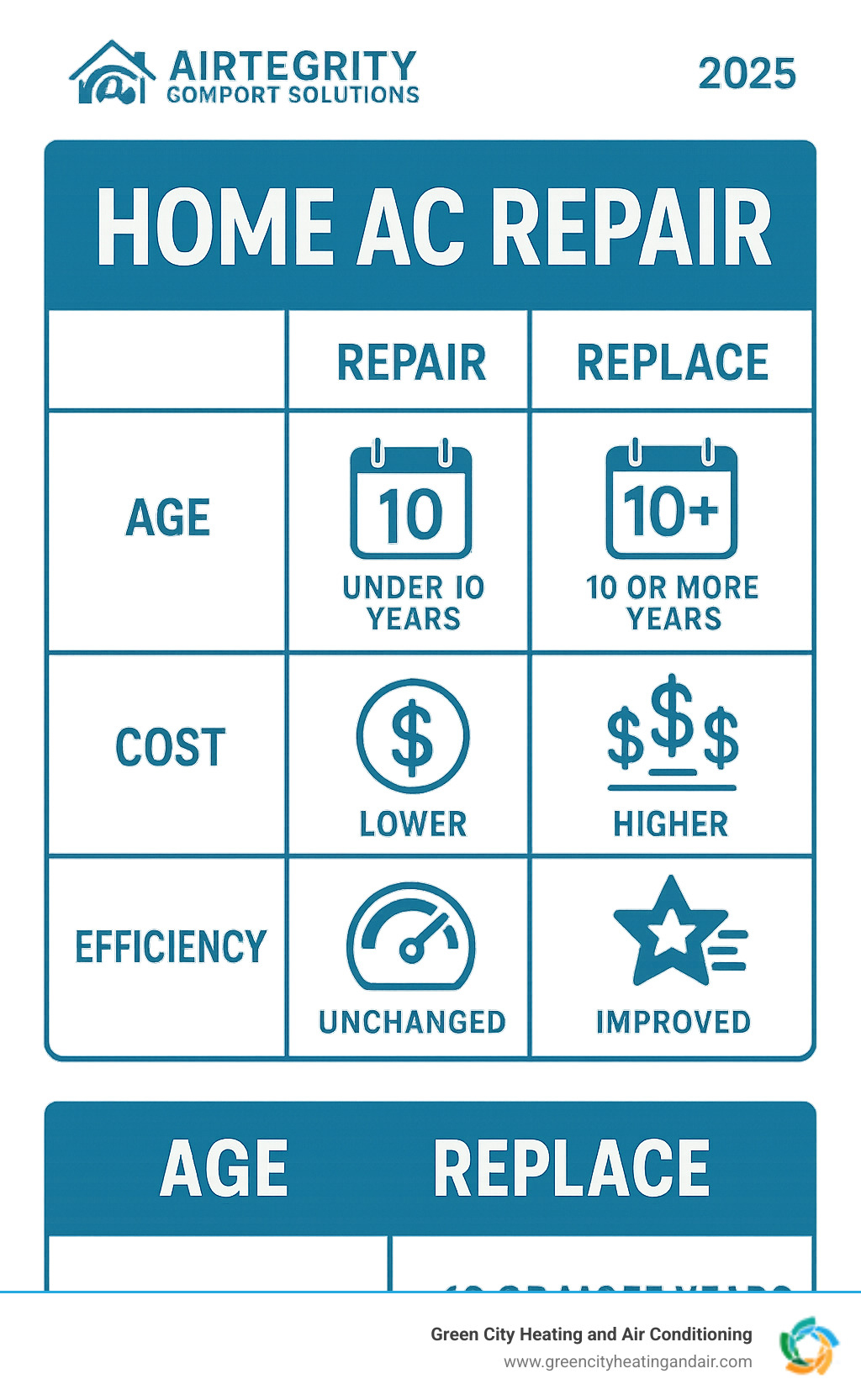
When Replacement is the Smarter Choice
Sometimes, replacement is the best long-term solution for your comfort and your wallet.
An age over 10 years combined with a major repair need, like a new compressor, usually signals it's time to replace. You're essentially putting a new heart in an aging body.
The 50% rule is a helpful guideline: if the home ac repair costs more than half the price of a new system, replacement is the more financially sound choice.
Poor energy efficiency is a key reason to upgrade. Modern high-efficiency units can cut your cooling costs by 20-40% compared to systems from a decade ago. This monthly saving adds up.
Upgrading to high-efficiency units also brings comfort improvements like smart thermostats, variable-speed technology for precise adjustments, and superior humidity control.
Today's systems are highly reliable and come with excellent warranties, giving you consistent, efficient comfort for years to come.
Finding a Pro: Navigating the World of Home AC Repair
When DIY efforts fall short, it's time to call in the experts. But how do you choose the right home ac repair service?
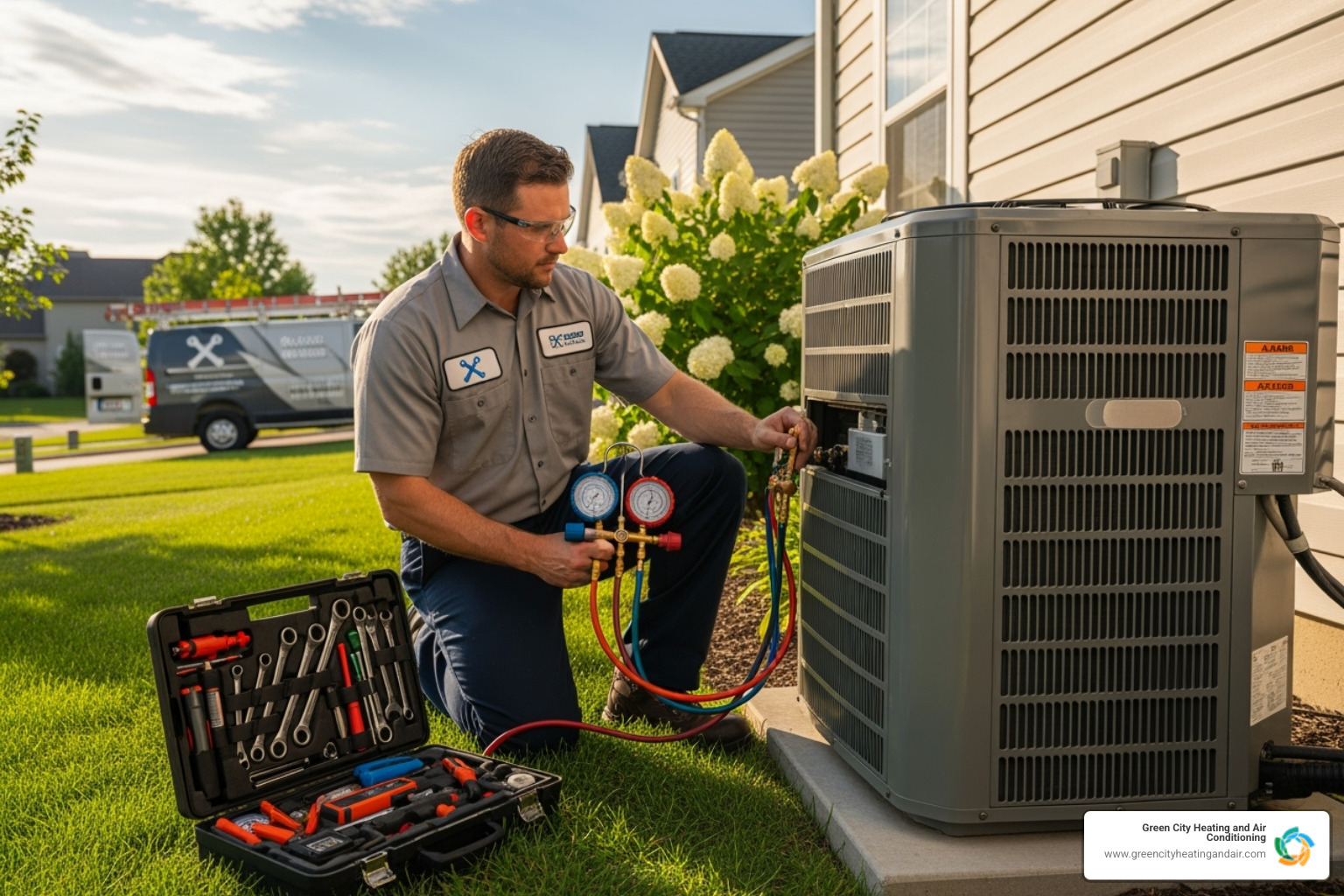
When your AC is broken and temperatures are rising, you want a knowledgeable, reliable, and punctual technician.
The first thing to look for is licensing and insurance. This protects you. Licensed technicians understand safety protocols, and insurance covers you if anything goes wrong. At Green City Heating and Air Conditioning, our technicians are fully licensed, background-checked professionals.
Positive reviews reveal a company's commitment to quality work and customer service. We're proud of our customer reviews, as they reflect our goal to get the job done right the first time.
Transparent pricing is essential. A reputable company will explain all diagnostic, part, and labor costs upfront, with no hidden fees.
Look for companies that offer warranties on parts and labor. A solid guarantee shows confidence in the quality of the repair work.
Local expertise matters. A company familiar with your area understands local climate challenges and building codes. As a family-owned business serving King, Pierce, and Snohomish Counties for over 30 years, we know what local homes need to stay comfortable.
Key Factors in the Cost of Home AC Repair
Understanding what influences the cost of home ac repair helps you make informed decisions.
- Diagnostic Fee: Covers the technician's time and expertise to identify the problem. Many companies apply this fee toward the final repair cost.
- Type of Repair: A simple capacitor replacement is affordable, while fixing a refrigerant leak or replacing a compressor is more involved and costly.
- Part Costs: These vary widely. A technician should explain what part failed and its replacement cost.
- Labor Rates: These reflect the technician's skill and experience. Emergency or after-hours service typically costs more.
- System Accessibility: If a unit is in a hard-to-reach location, the repair may take more time and cost more.
The Benefits of Professional Home AC Repair
While DIY troubleshooting is a great first step, professional home ac repair offers significant value.
- Accurate Diagnosis: Experienced technicians have the tools and knowledge to find the root cause of the problem quickly.
- Safety: Professionals are trained to handle high-voltage electrical components and high-pressure refrigerants safely.
- Proper Tools: Technicians use specialized gauges, leak detectors, and calibration equipment to ensure repairs are done correctly.
- Long-Term Solutions: We focus on addressing the root cause, not just applying a temporary fix.
- System Efficiency: A professionally repaired and calibrated system uses less energy, saving you money on utility bills.
- Peace of Mind: Knowing the job was done right by skilled, background-checked professionals lets you relax and enjoy your comfortable home.
Frequently Asked Questions about AC Repair
Over our 30+ years serving King, Pierce, and Snohomish Counties, we've heard just about every AC question imaginable. Here are the most common ones we get during home ac repair calls:
How often should I service my air conditioner?
We recommend annual service for standard air conditioners. If you have a heat pump that runs year-round, bi-annual service (spring and fall) is best. Regular professional tune-ups extend your system's lifespan, maintain efficiency to lower energy bills, and catch small issues before they become expensive emergency repairs during a Pacific Northwest heat wave.
Most HVAC systems can last up to 20 years with regular service and timely repairs, and professional maintenance is the key to achieving that.
What information should I have ready when I call for service?
Being prepared helps us serve you faster. When you call for home ac repair, please have this information ready:
- Your unit's make and model (if possible).
- The approximate age of your system.
- Specific symptoms (e.g., "It's blowing warm air," or "There's a loud grinding noise").
- Any troubleshooting steps you've already tried.
- Your address and contact information.
Can I recharge my home AC myself?
The short answer is no. This is a job strictly for certified professionals for several important reasons.
First, refrigerant handling is hazardous. These chemicals can cause frostbite and respiratory damage if handled improperly. There are also strict EPA regulations that limit refrigerant handling to certified technicians to protect both individuals and the environment.
Second, if your AC is low on refrigerant, it almost always means there's a leak. Simply adding more refrigerant is a temporary fix that doesn't solve the underlying problem. Our technicians use specialized tools to find and repair leaks, then recharge the system to the manufacturer's exact specifications. This ensures your system runs efficiently and reliably.
Conclusion
When your air conditioner falters during a warm Pacific Northwest summer, it's easy to feel overwhelmed. But you are now equipped with the knowledge to understand many home ac repair situations.
By recognizing warning signs like weak airflow, unusual noises, and high energy bills, you can act early to prevent a complete system breakdown. Simple DIY steps like checking your thermostat, changing the air filter, and keeping your outdoor unit clear can solve many common issues.
Regular maintenance is your best defense against costly repairs. Annual professional tune-ups are crucial for extending your system's life, maximizing efficiency, and ensuring reliability.
When facing the repair vs. replace decision, if your unit is over 10 years old and needs a major repair, replacement is often the smarter long-term investment, offering significant savings on energy bills.
At Green City Heating and Air Conditioning, we've been helping families in King, Pierce, and Snohomish Counties stay comfortable for over 30 years. As a local, family-owned business, we are committed to your comfort and peace of mind.
Your comfort is our priority. Whether you need a simple repair, annual maintenance, or are considering a new system, our skilled team is ready to provide the expert, reliable service you deserve.
More Blogs
Latest
insights and tips
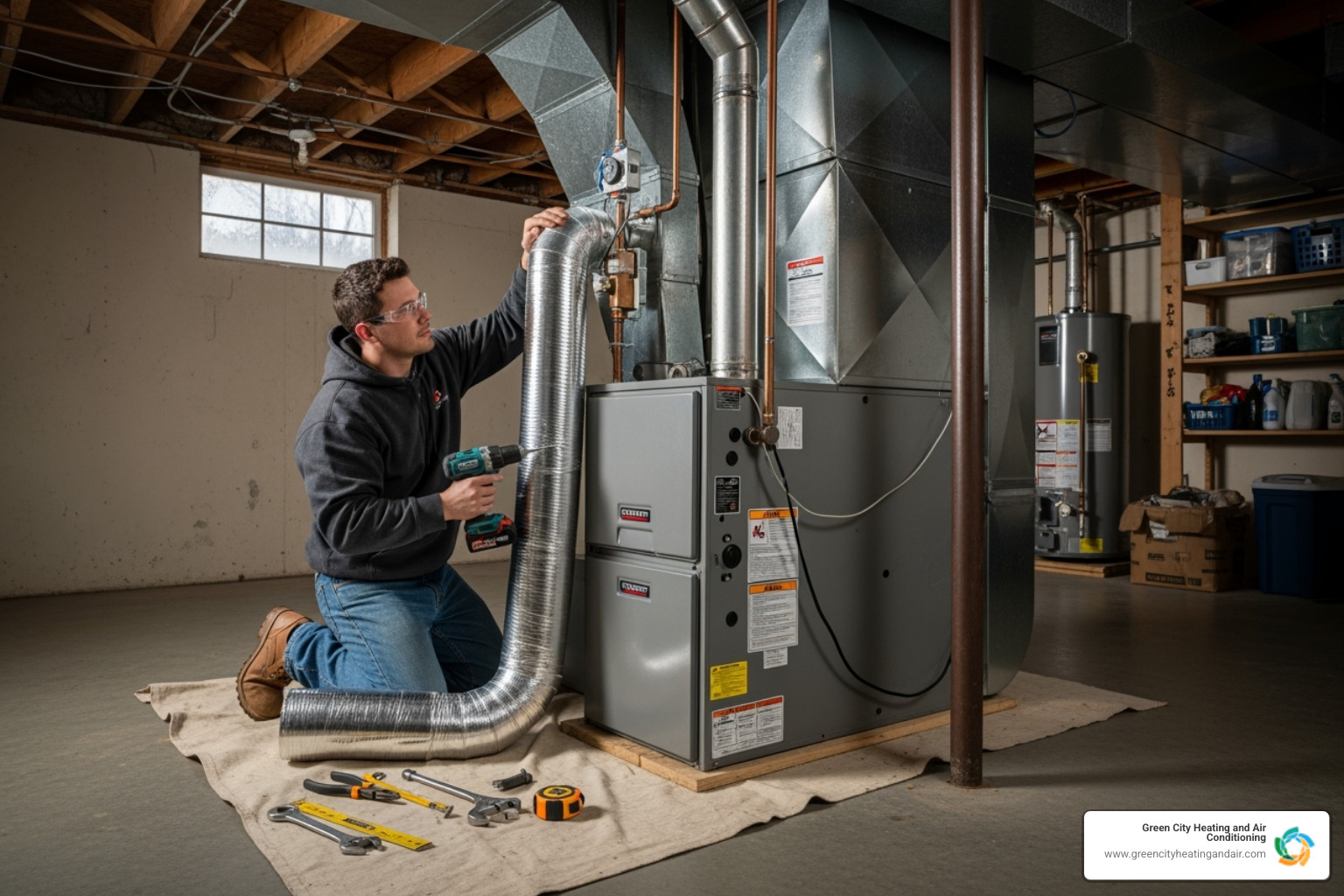
Warmth Unleashed: The Ultimate Seattle Furnace Installation Handbook
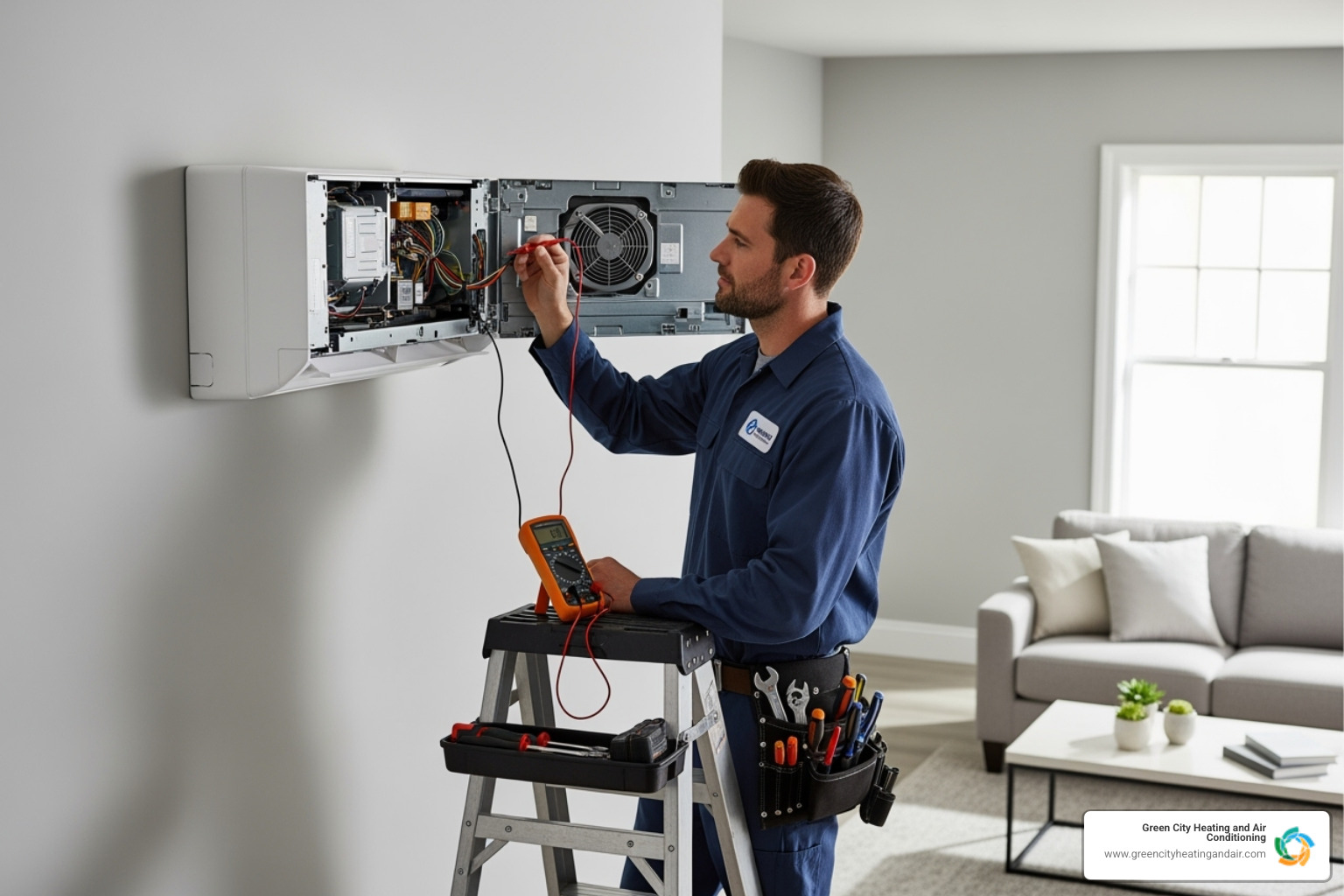
Emergency Ductless AC Repair in Bellevue: Get Your Cool Back Fast
